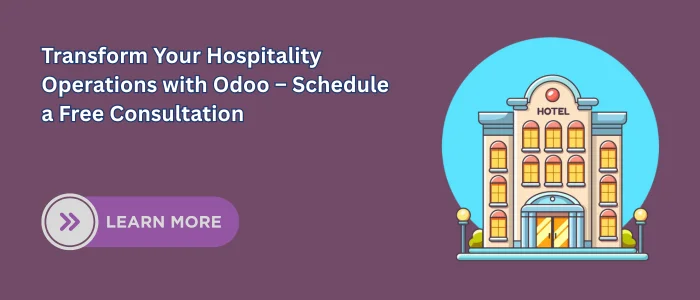Introduction
Odoo for Hospitality unifies reservations, housekeeping, F&B, billing, and finance into a single automated ERP platform. Designed for hotels, resorts, and serviced apartments, Odoo streamlines operations, enables faster check-ins, improves guest communication, and ensures transparent billing. With real-time dashboards and centralized workflows, hospitality businesses can enhance guest satisfaction while reducing administrative overhead. Partnering with an experienced Odoo Development Company supports seamless digital transformation.
1. Digital Transformation in Hospitality with Odoo for Hospitality
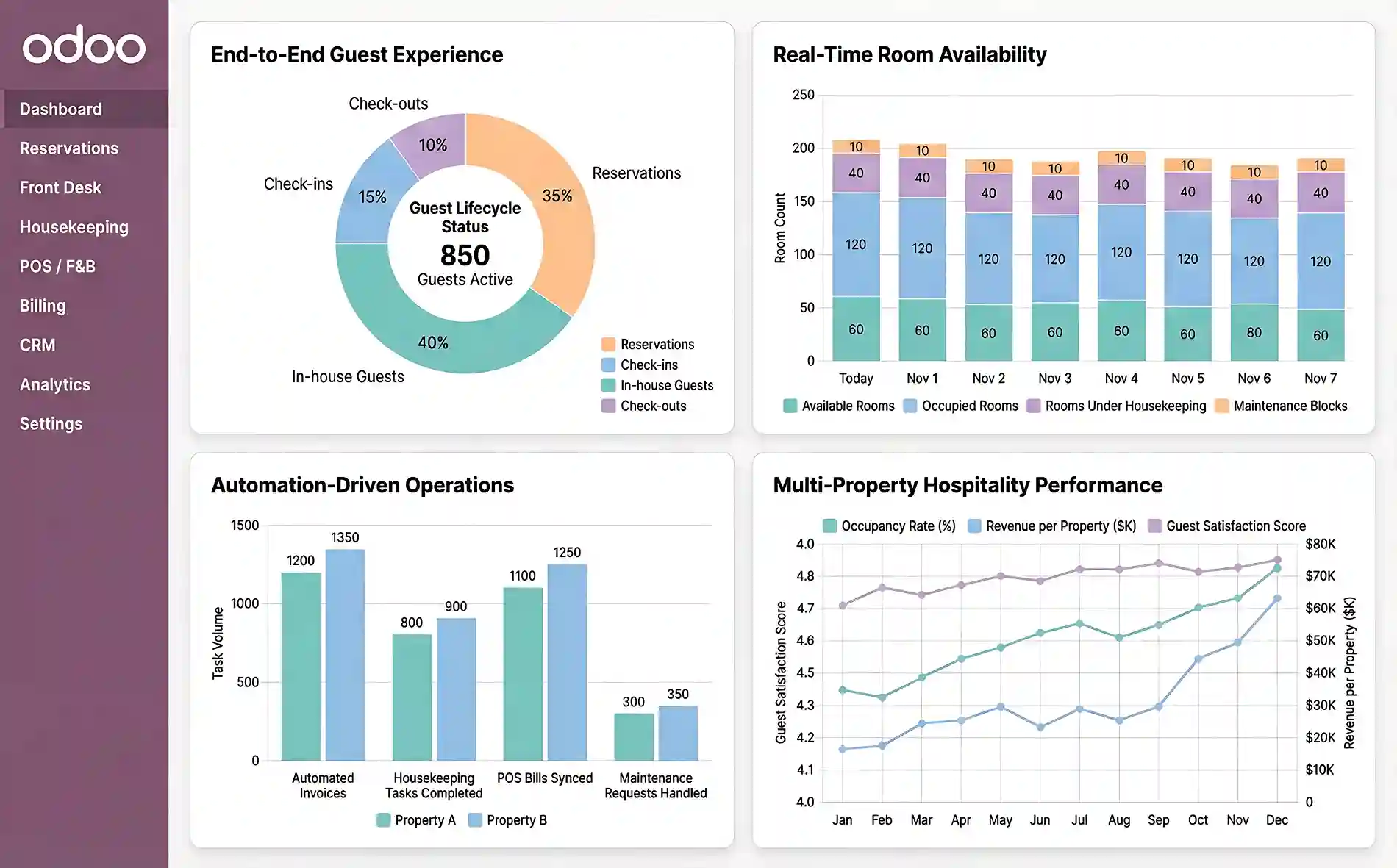
Hotels and hospitality businesses must manage complex operations from guest reservations and housekeeping to billing, F&B services, staff coordination, and multi-property management. Odoo for Hospitality streamlines these operations into a single, digital ecosystem, improving efficiency, reducing manual errors, and enhancing guest experience.
Moreover, with rising competition and evolving guest expectations, Odoo provides the scalability and automation required to stay ahead in today’s dynamic hospitality landscape.
Unified Guest Experience Platform for End-to-End Service Delivery
Guest-facing operations are traditionally fragmented across multiple systems PMS, POS, CRM, and billing. Odoo unifies these elements, enabling:
- Seamless booking-to-checkout workflows
- Real-time room availability and rate updates
- Integrated CRM for personalized guest engagement
- Unified data across housekeeping, reception, and F&B
- Centralized guest history, preferences, and loyalty tracking
Additionally, this unified view improves service quality, reduces guest friction, and enables hotels to deliver personalized experiences at scale.
Automation as the Core Driver for Operational Efficiency
Hotel operations depend on speed and accuracy. Odoo automates repetitive tasks that traditionally slow down staff and impact service consistency.
Automation Capabilities
- Instant invoice generation at checkout
- Automated room assignment and housekeeping scheduling
- Real-time POS billing sync for restaurants and bars
- Smart reminders for maintenance and service requests
- Auto-updated occupancy dashboards
Consequently, staff productivity increases and operational bottlenecks reduce significantly
Scalable Architecture for Multi-Property & Boutique Hotel Operations
Whether managing a single boutique hotel or a large multi-property chain, Odoo’s modular architecture ensures consistent performance and seamless scaling.
Scalability Strengths
- Centralized management of multiple branches
- Unified reporting for revenue, occupancy, and expenses
- Configurable modules for hotels, resorts, cafes, and spas
- Cloud-ready infrastructure for remote management
- Consistent SOPs across all properties
A practical example of scalable expansion is detailed in Scaling a Boutique Hotel Chain Using Odoo’s Customizable Modules.
2. End-to-End Hospitality Operations & Guest Lifecycle Management with Odoo for Hospitality
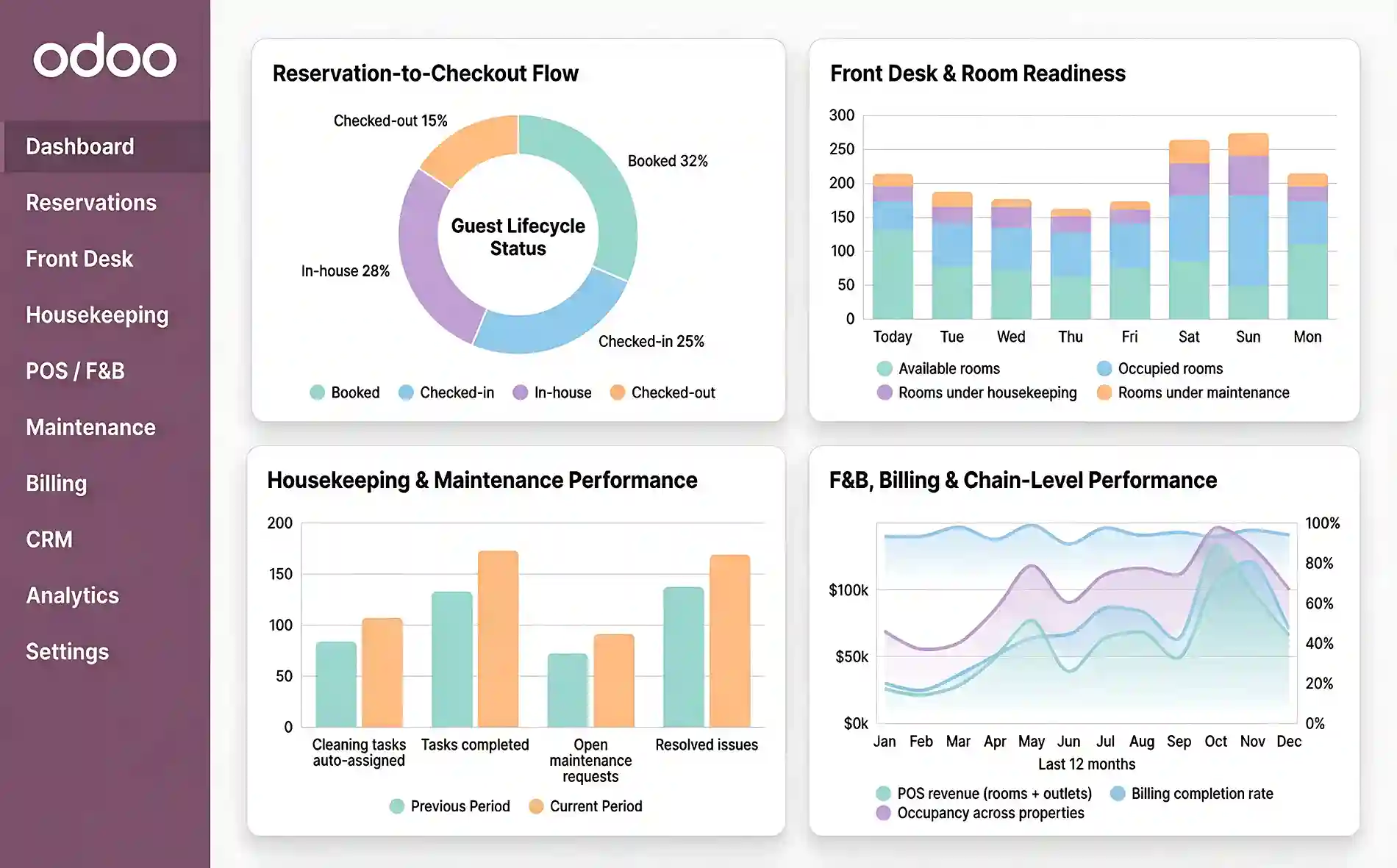
Hospitality operations span multiple interconnected functions—reservation management, front office operations, housekeeping, F&B, payments, maintenance, guest experience, and finance. Odoo for Hospitality unifies these processes into a seamless digital ecosystem, enabling service-driven efficiency and operational discipline. Moreover, its modular structure ensures that hotels can automate workflows at their own pace while reducing overhead and improving guest satisfaction.
Centralized Reservation, Booking & Front Office Management
A hotel’s front desk is the heart of its operations. Odoo centralizes all booking and reservation workflows, ensuring real-time accuracy across departments.
Front Office Capabilities
- Integrated online and offline booking management
- Smart room allocation based on availability and guest preferences
- Automated rate updates across channels
- Quick check-in/check-out workflows
- Centralized guest profiles with complete stay history
Additionally, real-time synchronization between the PMS, CRM, and billing system ensures zero discrepancies during peak check-in periods.
Housekeeping Automation, Room Readiness & Maintenance Management
Clean rooms and timely housekeeping directly impact guest satisfaction scores. Odoo automates and streamlines these workflows to ensure operational readiness.
Housekeeping Enhancements
- Auto-assigned cleaning tasks based on check-ins/check-outs
- Live room status tracking (Clean, Occupied, Out of Service, Ready)
- Staff performance monitoring
- Integrated maintenance requests for damaged assets
- Mobile access for housekeeping teams
This digital coordination reduces service delays and ensures rooms are guest-ready at the right time
Streamlined F&B, POS Integration & Hospitality Payment Automation
Food & beverage operations are critical revenue centers. Odoo integrates POS systems across restaurants, bars, banquet services, and cafes.
F&B Operational Features
- Real-time POS order synchronization with room billing
- Menu management and dynamic pricing
- Table management and order routing to kitchen/bar
- Recipe costing and inventory deduction automation
- Unified billing for multi-outlet purchases
To understand deeper financial automation, see Integrating Hospitality Payment Systems with Odoo ERP, which explains how payment workflows become faster, more accurate, and more secure.
Multi-Property, Franchise & Chain-Level Management
Hospitality businesses with multiple branches require standardized processes and consolidated reporting. Odoo simplifies this through its multi-company architecture.
Chain Management Features
- Shared guest profiles across properties
- Unified financial reporting for all locations
- Centralized inventory, procurement, and vendor management
- Standardized SOP templates and automation flows
- Real-time comparison of occupancy and revenue per property
A real-world example is described in Scaling a Boutique Hotel Chain Using Odoo’s Customizable Modules, showcasing how chains achieve rapid operational expansion with Odoo.
Administrative Cost Reduction, Workflow Optimization & Back-Office Automation
Manual admin tasks inventory, procurement, vendor coordination, staff scheduling, financial tracking consume time and reduce profitability. Odoo reduces these overheads through automation.
Back-Office Optimization Capabilities
- Automated procurement workflows
- Vendor bill approvals and reconciliation
- Staff scheduling and shift planning
- Inventory forecasting and real-time consumption tracking
- Automated financial statements and revenue reports
A detailed success story is outlined in Case Study: Reducing Hotel Administrative Costs with Odoo, demonstrating measurable cost reductions in real hospitality environments.
Traditional Hotel Operations vs. Odoo for Hospitality
| Area | Traditional Workflow | Odoo for Hospitality |
|---|---|---|
| Reservations | Manual updates, double bookings | Fully synchronized booking engine |
| Housekeeping | Paper-based coordination | Automated task assignment |
| Billing | Disconnected systems | Unified POS + PMS billing |
| Multi-Property | Fragmented oversight | Centralized chain management |
| Admin Costs | High and repetitive | Reduced through automation |
3. Financial Automation, Payment Processing & Compliance Management in Odoo for Hospitality
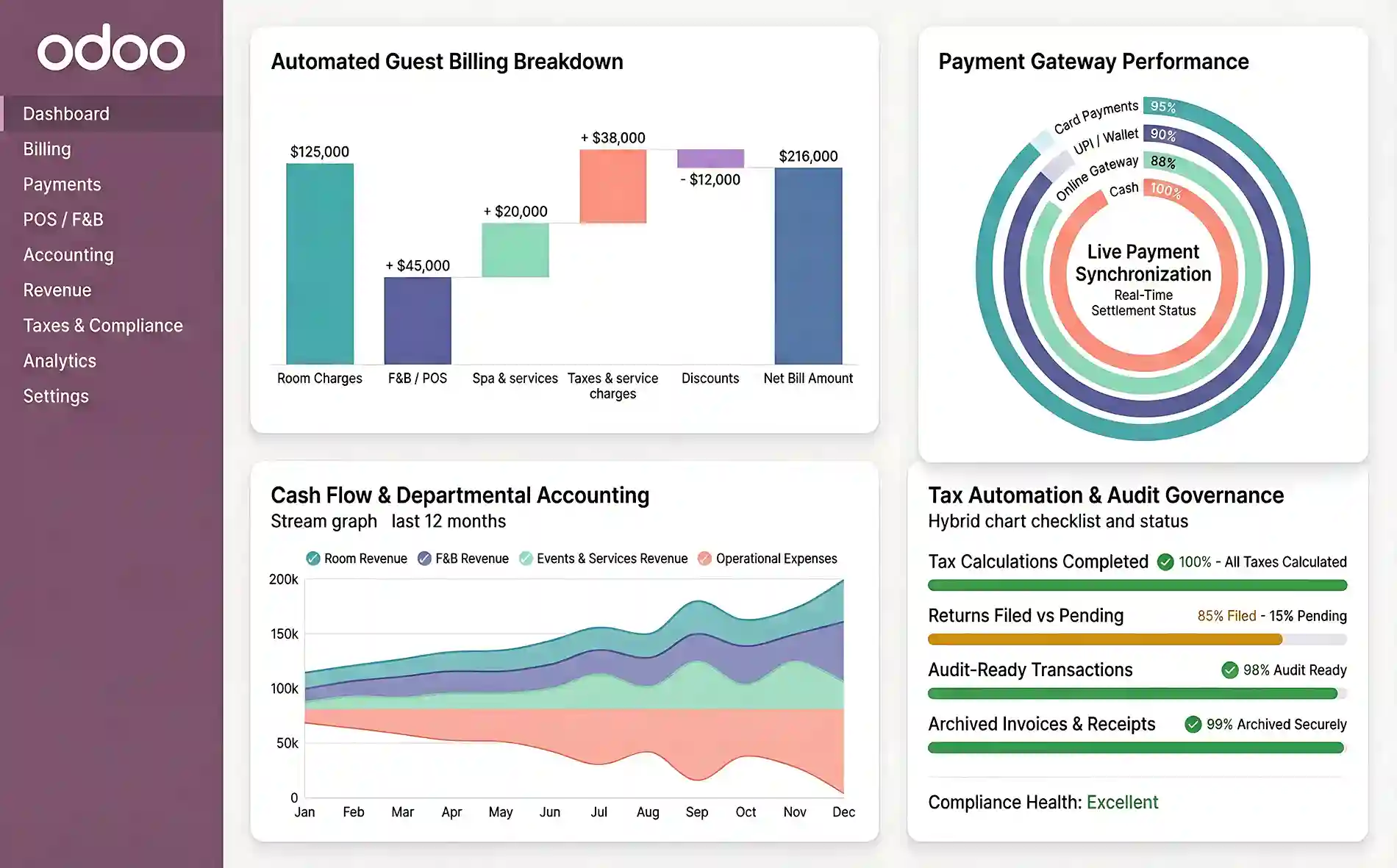
Financial operations are among the most complex components of hospitality management. Hotels must handle room charges, F&B bills, POS transactions, event fees, vendor payments, multi-tax structures, and real-time revenue reporting. Odoo for Hospitality brings all of these financial operations into a single unified system, ensuring precision, speed, and transparency. Moreover, centralized financial data allows management to make better pricing, budgeting, and operational decisions.
Unified Billing, Automated Invoicing & Real-Time Payment Synchronization
Traditional hotel billing requires manual consolidation of room charges, restaurant bills, minibar consumption, spa usage, and other service fees. Odoo automates these workflows to eliminate delays and human error.
Billing Automation Features
- Automatic merging of POS and room charges
- One-click invoice generation at checkout
- Multi-currency support for international guests
- Automatic application of taxes and service charges
- Real-time payment capture (cash, card, wallet, UPI, online)
Additionally, Odoo reduces billing disputes by maintaining a precise, time-stamped record of all guest expenditures.
Integrated Payment Gateways for Faster Hospitality Transactions
Hotels require fast, reliable, and secure payment processing systems. Odoo integrates seamlessly with leading payment gateways and POS hardware.
Payment System Capabilities
- Online booking payments
- Deposit and pre-authorization management
- POS-to-room billing synchronization
- Refunds and charge adjustments
- Secure transaction handling via PCI-DSS-compliant gateways
To explore deeper payment workflow integration, refer to Integrating Hospitality Payment Systems with Odoo ERP, which highlights how hotels streamline financial operations
Complete Accounting Suite for Hotels, Resorts & Multi-Property Groups
Odoo’s accounting module connects directly to PMS, POS, inventory, and procurement systems, ensuring highly accurate financial reporting.
Accounting Features
- Automated journal entries for all revenue channels
- Department-wise expense tracking
- Budgeting for rooms, housekeeping, F&B, and events
- Vendor bill management and reconciliation
- Cash flow analytics and revenue forecasting
- Asset depreciation for hotel equipment and infrastructure
Moreover, real-time dashboards help finance teams track profitability and operational costs with complete clarity.
Revenue Management, Dynamic Pricing & Financial Forecasting
Hotels must adjust pricing based on demand, occupancy, seasonality, and competition. Odoo provides data-driven insights that support smart revenue management strategies.
Revenue Optimization Tools
- Occupancy-based pricing adjustments
- Forecasting based on historical demand
- Profitability tracking per room type or service
- Comparative performance analysis across properties
- Discount, promotion, and package management
Consequently, hotels can optimize revenue without compromising guest satisfaction.
Audit-Ready Compliance, Tax Automation & Financial Governance
Hospitality businesses operate under strict financial regulations, tax rules, and audit requirements. Odoo ensures complete compliance through automated recordkeeping and reporting.
Compliance Strengths
- Automated tax calculations for services, rooms, and F&B
- Region-specific tax configuration
- Audit trail for all transactions
- Digital receipt and invoice archiving
- Secure role-based access controls
Furthermore, Odoo’s transparency reduces financial risks and ensures smooth audits across all departments.
4. Guest Experience, Communication & Loyalty Enhancement with Odoo for Hospitality
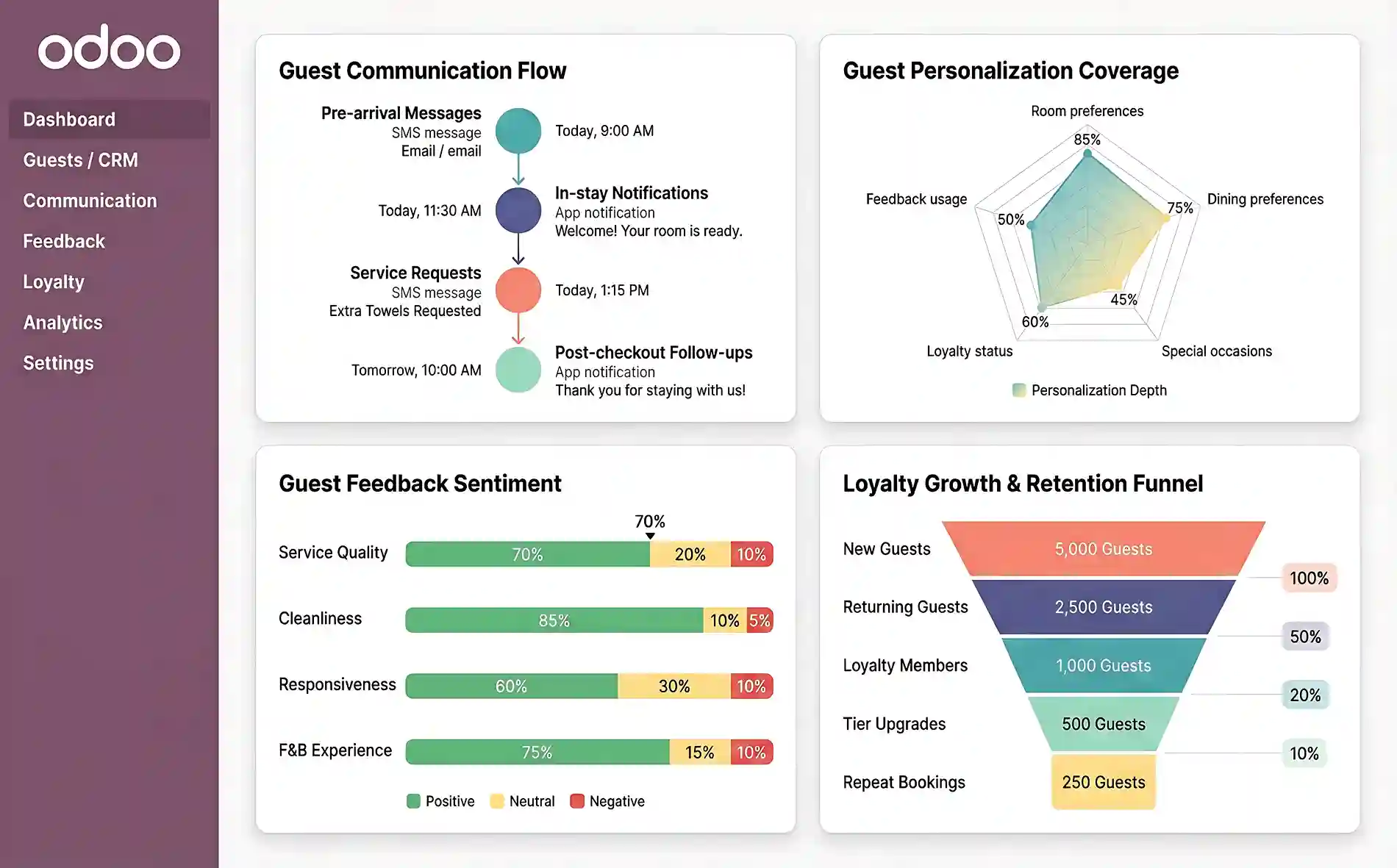
In the hospitality industry, exceptional guest experience is the ultimate competitive advantage. Guests expect seamless communication, personalized service, quick responses, and smooth touchpoints throughout their stay.
Odoo provides an integrated digital ecosystem that brings together CRM, communication tools, feedback channels, and loyalty management—enabling hotels to deliver memorable, consistent, and high-quality experiences. Moreover, automation ensures that staff can focus more on service delivery and less on administrative tasks.
Centralized Guest Communication Across the Entire Stay
Hotels often struggle with fragmented communication across departments—front desk, housekeeping, concierge, restaurant, and billing teams. Odoo centralizes these interactions in one unified platform.
Communication Enhancements
- Automated pre-arrival messages and confirmations
- Real-time updates for room readiness and special requests
- In-stay notifications for services, events, and offers
- Multi-channel communication (email, SMS, portal)
- Logged communication history for staff reference
Additionally, instant access to guest requests ensures quick response times and reduces service delays.
Personalized Guest Profiles for Tailored Hospitality Experiences
Modern guests prefer experiences that feel tailored to their needs. Odoo tracks detailed guest preferences and behaviors.
Guest Personalization Capabilities
- Preferences for room type, amenities, or dining
- Purchase history across F&B, spa, and activities
- Special occasions (birthdays, anniversaries)
- Feedback history for service improvement
- Loyalty points tracking and reward eligibility
Consequently, hotels can deliver premium, personalized experiences that build long-term loyalty.
Integrated Feedback, Complaint Management & Service Recovery
Guest feedback is essential for improving hospitality operations. Odoo automates feedback collection and simplifies issue resolution.
Feedback & Service Recovery Features
- Automated surveys after check-in, dining, or checkout
- Ticketing workflows for complaints or issues
- Priority-based escalation to relevant departments
- Resolution tracking and reporting
- Analytics on recurring guest concerns
Moreover, structured feedback loops help improve service quality and guest retention.
Loyalty Programs, Membership Levels & Guest Retention Strategies
Loyalty is one of the strongest revenue drivers for hospitality businesses. Odoo supports configurable loyalty programs tailored to different guest segments.
Loyalty Program Capabilities
- Point-based rewards for stays and services
- Tiered membership levels (Silver, Gold, Platinum)
- Exclusive offers, upgrades, and benefits
- Integrated redemption across all POS outlets
- Automated tracking of guest eligibility and benefits
This unified loyalty approach fosters repeat business and strengthens guest relationships across all hotel properties.
5. Workforce Productivity, Staff Collaboration & Operational Alignment in Odoo for Hospitality
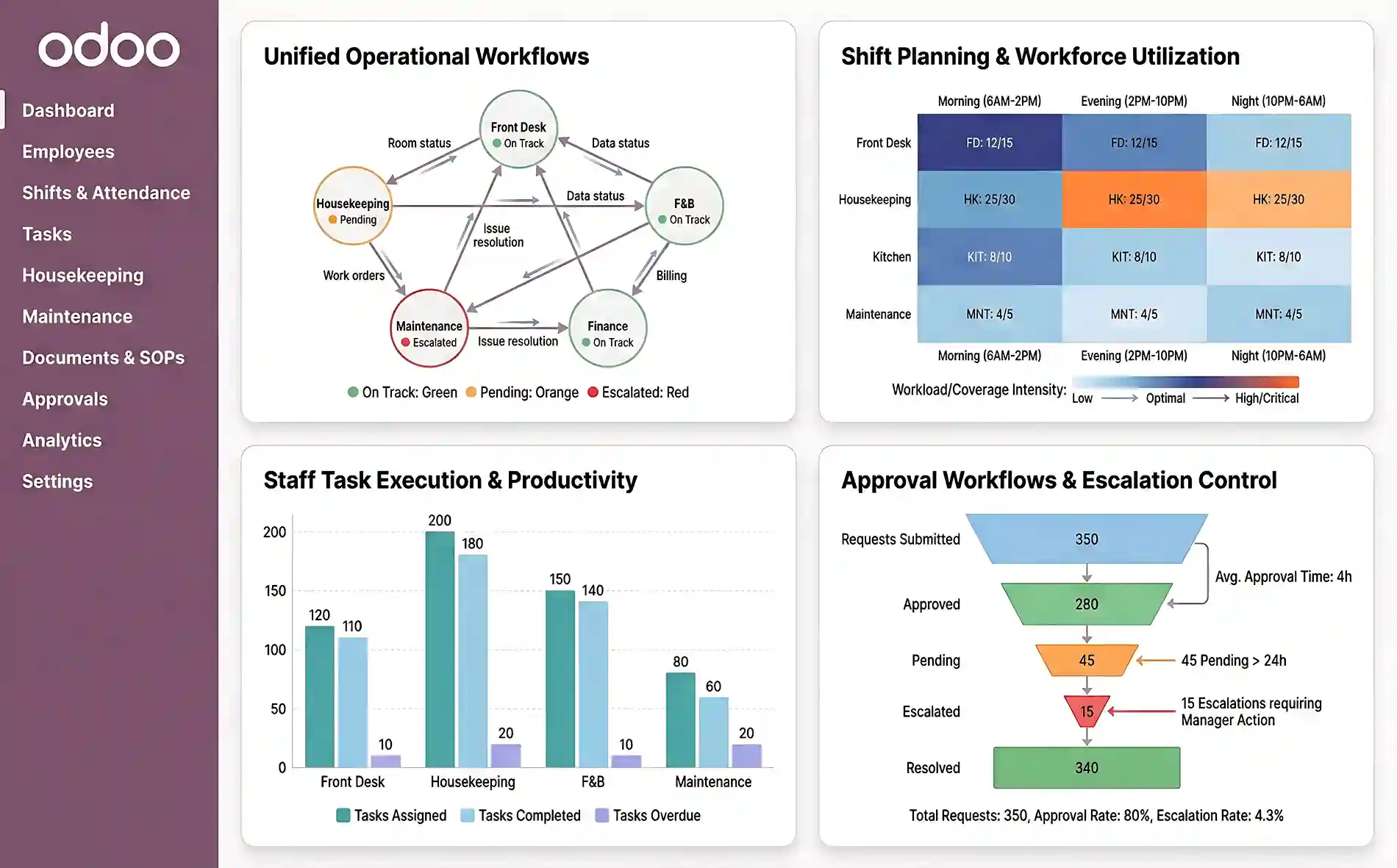
Hospitality success depends heavily on coordinated teamwork. From front office and housekeeping to kitchen staff, maintenance teams, and management every department must operate in sync to deliver consistent, high-quality guest experiences.
Odoo provides an integrated digital workspace where staff can collaborate, share updates, automate tasks, and maintain operational transparency. Moreover, real-time visibility enables leadership to optimize manpower, reduce delays, and maintain high service standards.
Unified Operational Workflows Connecting All Hotel Departments
Fragmented communication often leads to service delays, double work, and guest dissatisfaction. Odoo seamlessly connects workflows across the property.
Cross-Department Synergy Includes
- Front desk assignments instantly trigger housekeeping updates
- F&B orders sync with POS and room billing
- Maintenance requests auto-route to technical teams
- Inventory updates reflect across restaurants, bars, and stores
- Finance receives live updates on revenue from PMS + POS
Additionally, Odoo ensures that every action is logged, traceable, and synchronized, reducing miscommunication across shifts and teams.
Staff Task Management, Shift Planning & Productivity Monitoring
Hotels operate 24/7 with rotating shifts, high staff turnover, and constant activity. Odoo streamlines workforce management with smart planning tools.
Productivity Tools for Staff
- Automated shift schedules with role assignments
- Task lists for housekeeping, front office, kitchen & maintenance
- Real-time task completion tracking via mobile devices
- Attendance monitoring and biometric integration
- Performance dashboards for managers
Consequently, supervisors can identify workload patterns, optimize shift planning, and maintain consistent staffing levels during peak and off-peak hours.
Digital Document Control, SOP Alignment & Internal Communication
Hotels maintain numerous operational documents—SOPs, checklists, maintenance logs, staff training materials, and safety protocols. Odoo centralizes these documents with secure access controls.
Collaboration & Documentation Features
- Shared repositories for SOPs and operational guidelines
- Role-based access to critical documents
- Version control to maintain updated procedures
- Internal notes for shift handovers and guest context
- Training materials for onboarding new staff
Furthermore, staff across departments operate with clarity, consistency, and updated instructions—improving service reliability.
Approval Workflows, Escalation Rules & Management Oversight
Hospitality operations depend on timely approvals—for maintenance budgets, vendor bills, discounts, refunds, upgrades, or guest recovery gestures. Odoo automates these flows for faster decision-making.
Approval Automation Benefits
- Custom approval rules for financial and operational tasks
- Escalation paths for delayed approvals
- Transparent logs for audit and quality checks
- Dashboards showing pending actions and bottlenecks
- Faster service recovery and reduced guest wait times
Moreover, leadership gains full oversight of operational delays and staff performance, fostering a culture of accountability.
6. Odoo-Powered Property Management System (PMS) for Hotels & Resorts
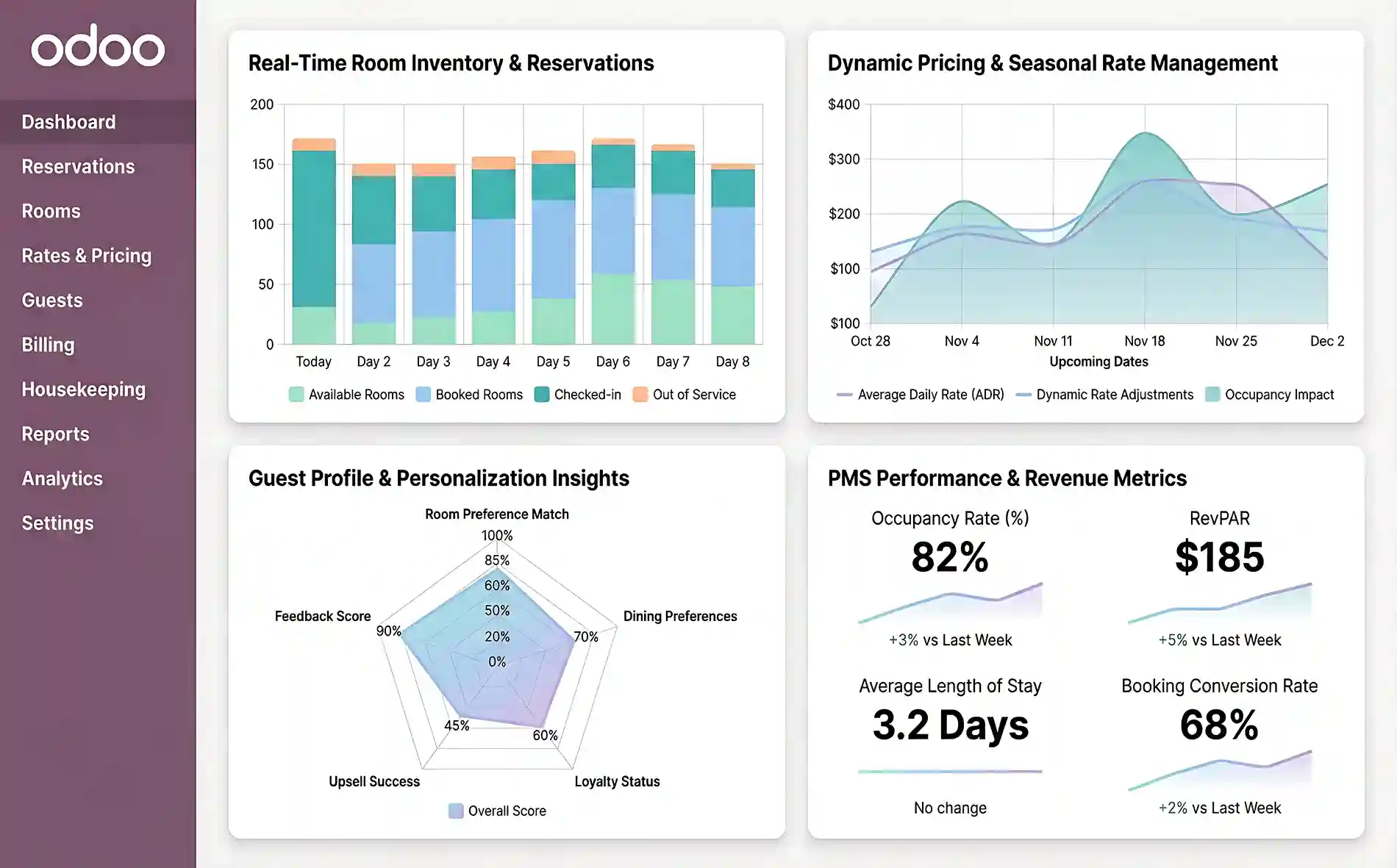
A modern Property Management System (PMS) must manage every stage of the guest journey from reservation to checkout while ensuring strong internal coordination. Odoo centralizes room inventory, bookings, billing, and guest profiles into a single, intelligent platform.
Moreover, its open architecture allows hotels to customize workflows to match their operational style, making it ideal for boutique hotels, luxury resorts, and large chains.
Centralized Reservation Engine with Real-Time Room Inventory Sync
This Hospitality IT Solution automates reordering based on minimum stock rules. You no longer need to manually check shelves to know what to order.
- Automatic RFQs: Generate Requests for Quotation when stock is low.
- Vendor Management: Compare vendor prices and delivery times.
- Multi-Location Tracking: Manage stock across multiple warehouses or kitchens.
As a result, waste is minimized, and your capital is not tied up in excess stock, directly improving your bottom line.
Smart Rate Management & Dynamic Pricing for Seasonal Optimization
Pricing strategies significantly impact occupancy and revenue. Odoo allows hotels to configure dynamic rate rules that adjust automatically based on:
- Seasonality and peak periods
- Weekday vs. weekend demand
- Local events and competitor pricing
- Guest segments (corporate, group, loyalty members)
- Room type, package, or promotional offers
Consequently, revenue managers maximize RevPAR (Revenue Per Available Room) without relying on manual spreadsheets.
Integrated Guest Profiles for Personalized Hospitality Experience
Personalization is the new competitive advantage in hospitality. Odoo stores detailed guest information to enhance service quality.
Guest Profile Insights Include
- Stay history and booking behavior
- Preferred room type, amenities, or view
- Dining preferences and purchase patterns
- Special occasions (birthdays, anniversaries)
- Past complaints and feedback trends
Moreover, staff can tailor experiences—from welcome amenities to upselling opportunities—strengthening guest loyalty and satisfaction.
7. Odoo for Sustainability, Energy Optimization & Eco-Friendly Hospitality Operations
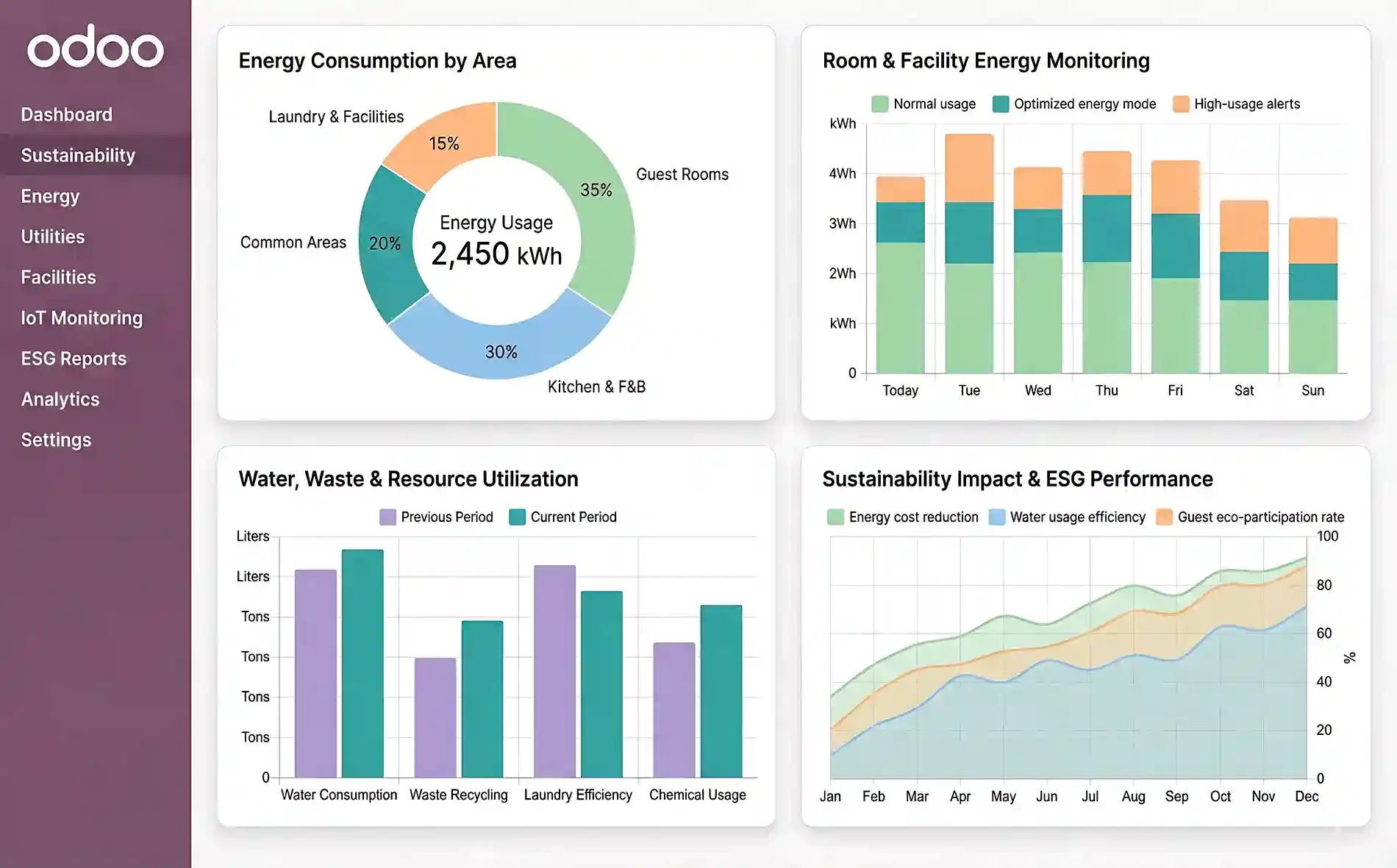
Sustainability has become a major priority for hotels globally. Guests increasingly prefer eco-friendly, energy-efficient properties. Odoo for Hospitality helps drive sustainability initiatives through digital tracking, workflow automation, and resource optimization
Energy Consumption Monitoring for Rooms & Facilities
Hotels can integrate IoT sensors with Odoo to track electrical usage across rooms and common areas.
Benefits Include
- Automated reports on high-consumption zones
- Alerts for unusual spikes in energy usage
- Optimization of HVAC systems through smart triggers
- Reduced electricity costs during low occupancy
Additionally, hotels can set sustainability benchmarks and monitor impact over time.
Waste, Water & Resource Utilization Tracking
Odoo supports structured sustainability reporting by tracking:
- Water consumption across kitchen, laundry & guest areas
- Waste separation and recycling metrics
- Chemical usage in pools, cleaning, and maintenance
- Laundry cycles and linen management
Moreover, sustainability officers can generate compliance-ready reports for ESG and green certification audits.
Eco-Friendly Guest Engagement Through Digital Tools
Odoo enables hotels to involve guests in sustainability initiatives through:
- Digital check-in to reduce paper usage
- App-based room controls for lights & AC
- Rewards for eco-friendly actions (linen reuse, low energy use)
- Automated sustainability communication via guest portals
This enhances brand positioning and strengthens guest loyalty toward environmentally conscious hotels.
Conclusion
Odoo for Hospitality streamlines hotel and resort operations by unifying reservations, housekeeping, F&B, payments, finance, and guest services into one automated platform. Its modular apps and real-time dashboards reduce friction, improve staff efficiency, and enhance guest satisfaction. For expert guidance, explore our Odoo Consulting Services
Choosing the right partner matters. SDLC Corp delivers tailored Odoo solutions for hospitality, offering consulting, custom modules, payment integrations, and full implementation support to help hotels achieve efficiency, visibility, and sustainable digital growth.
FAQ's
1. Why is SDLC Corp the best choice for Odoo for Hospitality implementation?
SDLC Corp combines extensive experience, domain knowledge, and strong technical expertise to deliver high-quality Odoo solutions tailored for hotels and hospitality brands. Their proven implementation methodology, real-world success, and ability to build scalable, efficient systems make them the ideal partner for digital transformation in the hospitality sector.
2. What are the main benefits of Odoo for Hospitality?
Odoo centralizes guest management, housekeeping, F&B operations, billing, payments, finance, and multi-property oversight. This reduces manual effort, improves accuracy, enhances guest experience, and supports faster decision-making.
3. Can Odoo integrate with hotel payment systems and POS outlets?
Yes. Odoo offers seamless integration with leading payment gateways and POS solutions. Hotels can synchronize room charges, F&B bills, deposits, refunds, and multi-channel payments. More insights are available in Integrating Hospitality Payment Systems with Odoo ERP.
4. Does Odoo support multi-property or hotel chain operations?
Absolutely. Odoo provides multi-company and multi-property support, enabling centralized control over reservations, billing, inventory, SOPs, and financial reporting. A practical example is covered in Scaling a Boutique Hotel Chain Using Odoo’s Customizable Modules.
5. How does Odoo help reduce administrative costs in hotels?
reporting dramatically cutting administrative workload. Real-world cost savings are demonstrated in Case Study: Reducing Hotel Administrative Costs with Odoo.
6. Can Odoo improve guest experience and communication?
Yes. Odoo enables automated messages, real-time updates, personalized guest profiles, loyalty programs, and integrated feedback channels. This leads to faster response times and better service delivery.
7. What operational challenges does Odoo solve for hospitality businesses?
Odoo addresses fragmented systems, manual housekeeping coordination, inconsistent billing, lack of real-time visibility, staff communication gaps, and multi-property complexity making hotel operations efficient, transparent, and scalable.

